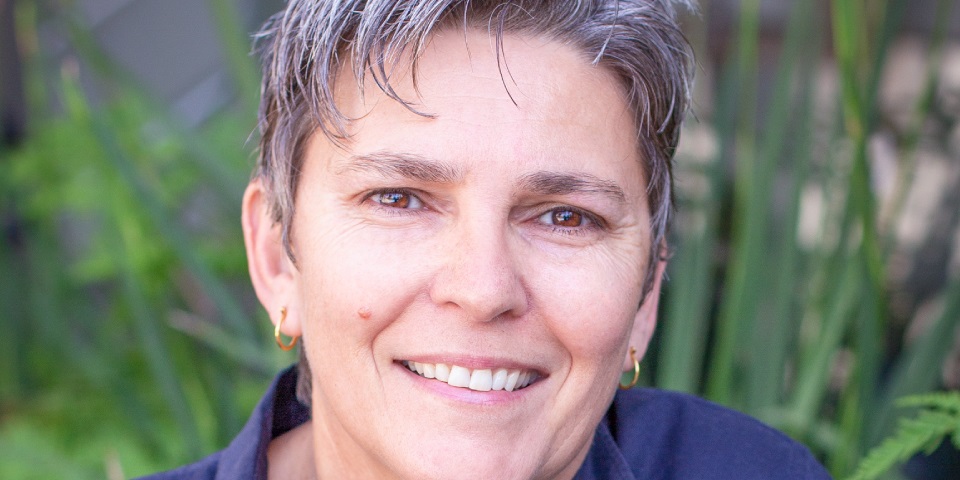In this monthly series, we hand over the blog platform to IAM’s staff to share their own journeys, stories and insights in their own words. Though our journeys are all unique and individual, many of us share common challenges and dilemmas as we simply attempt to lead our lives as people of faith while loving whom we love.
Rev Ecclesia de Lange has been the Director of IAM since 2017. She is an ordained minister of the Methodist Church of Southern Africa (MCSA). She holds a Comprehensive Honours degree in Theology from the University of Southern Africa (UNISA) and a Masters degree in Social Science from the University of Cape Town (UCT). After announcing to her congregation that she was going to marry her same-sex life partner, Ecclesia was charged, suspended, disciplined and discontinued as a Methodist minister in February 2010. She has been involved with IAM part-time since 2011, became a full-time staff member in 2014, and was appointed as director in June 2017. Here is Ecclesia’s story in her own words.
My journey to serve Jesus and be true to myself has been a complex one of full of learning, disappointment, frustration, and ultimately of hope and love.
During my late teens I came to the conclusion that I am a lesbian. I realized that this discovery would not be acceptable to my family or church and so I concealed it. I tried to fit in by being in heterosexual relationships, appearing to be “normal” and acceptable to the community. However, my ability to pretend to be heterosexual did not last and it wasn’t long before others found out about my sexual orientation. I was told in no uncertain terms that I cannot be Christian and lesbian. My family relationships and support system were shattered. The Church’s stance on homosexuality sent a clear message of rejection to me which forced me to leave the Church. The pain and loss were immense.
Several years later I had an encounter with God that made me return to the Church. I knew that God loved and accepted me, and I renewed my commitment and set out to find a Church that would accept me as well. It did not take me long to discover the official stance of the Church was unchanged on same-sex-relationships. At the time the only way for me to be included in the community was either to deny my sexual orientation and live a life of secrecy or live a life of celibacy.
The fear and pain of rejection weighed heavily on me. As my faith is very important to me, I tried to conform by attending support groups and going for counselling. I was also part of an ex-gay ministry (for recovering gay people) for several years. However, none of these efforts changed my sexual orientation. In order to obey the church’s teaching, I lived in denial of who I am, and I settled for a life of celibacy and secrecy. The suppression of the truth enhanced my pain and steered me into a deep hole of discontent and depression. Even during this period of denial I worried and wondered about what would happen should I meet someone and fall in love. Would I still be able to deny my sexuality, my need for love as well as my desire to give love and to live with a life companion?
My relationship and love for Jesus deepened over the years that followed. I heard and responded to God’s call to ministry by candidating for the ministry within the Methodist Church of Southern Africa (MCSA). My whole being was occupied, stimulated and challenged by the theological and ministerial training. I will be forever grateful to the MCSA for the wide expansive education given to me. It was here, during my theological studies that I encountered another perspective on the issue of homosexuality that challenged the traditional stance within the Church. I was also encouraged by the, so it seemed, inclusive policy of the Methodist Church that all people were welcome in the Church.
With much research and self-evaluation, I discovered new ways of interpreting scripture and coming to terms with who I am as a child of God. I learned that when one reads Scripture in context, the traditional verses that have been used to condemn homosexuality are in all probability not referring to a faithful, loving, committed, respectful relationship between two people of the same sex. I learned that by using the Wesleyan quadrilateral (scripture, experience, reason and tradition) that my sexuality is a gift from God. I learned that the Church has a sad history of being sure who to exclude only to repent later (e.g. the exclusion of women to the ordained ministry, apartheid). I also learned that at the heart of God is an all-inclusive love which is far wider than I can ever comprehend.
Through this learning, my relationship with Jesus found a new intensity as I embraced the acceptance of God’s love for me, just as I am. Afresh, I realized that nothing could separate me from God’s love and acceptance. I have also come to a new understanding that my sexuality is part and parcel of who God created me to be – and that God created someone beautiful. Indeed, the Gospel of Christ became very good news to me! This knowledge has brought me profound confidence and peace, yet it was accompanied by tension between my reality and the traditional stance of the MCSA. Listening to debates and colleagues’ comments on the issue has been a fearful and painful experience within the MCSA. Numerous times I wanted to stand-up and say “this is me you are speaking about; speak to me”. However, the lack of “a safe space” and the fear of rejection kept me in my seat.
By God’s grace, I met a wonderful person and entered into a committed, faithful relationship. In our desire to honour God, we celebrated our love relationship by getting married in December 2009. The context and sensitivity of the same-sex debate within the MCSA made me afraid to share the news. I wanted my congregation to be part of my celebration but was not sure how they would react to the news.
No longer able to bear the soul-destroying silence, I eventually announced my intended marriage to the congregation. I was overwhelmed by their support and good wishes. I came to see that it is better to be rejected for who I am than to be accepted for who I am not. My wish to marry a person of the same sex led to firstly my suspension as a Methodist Minister, then a finding of insubordination against me, and finally the discontinuation of my ministry in the MCSA. I then decided to take the matter to the courts. This brought huge stress and tension to my marriage, which we eventually had to take the painful decision to end.
I took the matter to the High Court, the Supreme Court of Appeal and the Constitutional Court. The courts were reluctant to get involved in matters of doctrinal interpretation and relied on the concept of freedom of religion. All three courts ruled that I had to submit to the church’s internal ‘arbitration’ system, which I did, and the internal arbitration found in favour of the MCSA.
That brought me to a painful and difficult decision. The court processes had not brought any relief to me or other LGBTI people of faith within the MCSA. I waived the right to refer the matter to the Equality Court, and instead decided to bring an end to the litigious process, which is in essence an adversarial one, and instead entered into a dialogue with the MCSA leadership in 2017. Despite a fruitful conversation, the aim of using the opportunity to release a joint statement about the need to break down walls of fear, to build bridges between opposing beliefs, and to send an inclusive message to the LGBTI community was not realized, and the MCSA decided to release a separate statement.
Inclusive and Affirming Ministries (IAM) has played a pivotal role, not only in my healing, but also in the formation of my spirituality , capacity to dialogue with clergy, to manage diversity and to hold the tension between those that oppose inclusivity (particularly based on Biblical text) and those who stand for inclusion of all. It has indeed been an intense journey of experiencing God in a new way.
For my part, I survived the most difficult part of the journey – self-acceptance – and made it through not broken but more confident and complete than I ever was. It has become my lifework to continue to stay in dialogue and fervent prayer that will lead to healing, reconciliation and inclusivity of all God’s people. God has been faithful – through all the pain and trauma I found new love.
Through my work with IAM I continue to use my experience to work towards removing the barriers between the church and LGBTI people of faith. It is my sincere prayer that the church will be an active participant in spreading the belief that all are equal before the eyes of God.











